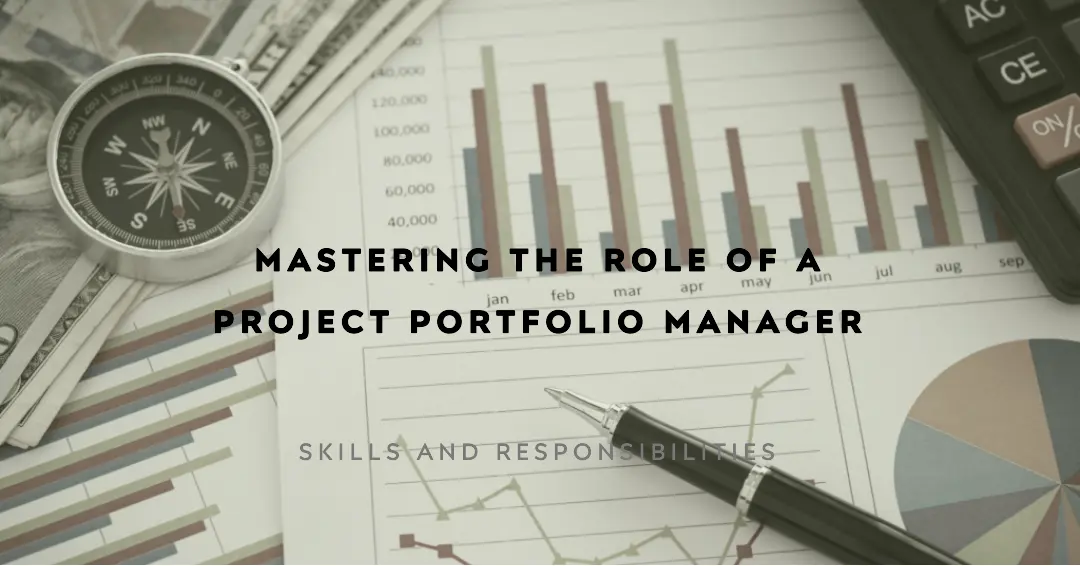To find out how Artificial Intelligence is changing the Project Management landscape, you may enjoy reading this article https://www.shaunstoltz.com/did-artificial-intelligence-just-change-everything-about-project-management/
I. Introduction
In the dynamic world of project management, a key role that often doesn’t get the spotlight it deserves is the Project Portfolio Manager (PPM). As organizations increasingly recognize the need to align projects with strategic goals, the importance of this role has surged to the forefront.
In this article, we will shine a light on the multifaceted role of the Project Portfolio Manager. From the critical responsibilities they bear to the vital skills they must possess, our deep-dive into this pivotal profession aims to demystify the path to becoming a successful PPM. Whether you are an aspiring Project Portfolio Manager, a professional keen to refine your skills, or simply curious about the inner workings of project management, this comprehensive guide promises insights aplenty.
So, what exactly is a Project Portfolio Manager? Where do they fit in the grand scheme of an organization? And, most importantly, what does it take to master this challenging yet rewarding role? Let’s find out!
Stay with us as we embark on this journey, uncovering the layers of project portfolio management and offering practical advice to help you excel in this critical position.
Get ready to turn the page and step into the world of a Project Portfolio Manager. Your journey towards mastering this role begins here!
II. The Role of a Project Portfolio Manager
In an increasingly project-based business landscape, the role of a Project Portfolio Manager is a lynchpin. But what is a Project Portfolio Manager, and where does this critical role fit in the organizational ecosystem? Let’s break it down.
A Project Portfolio Manager is a strategic conductor orchestrating the symphony of projects within an organization. They are responsible for ensuring that the entire portfolio of projects aligns with the strategic objectives of the organization. It’s a role that sits at the intersection of strategy and execution, leveraging resources and capabilities to maximize the value of the project portfolio.
Unlike a Project Manager who focuses on individual projects, a Project Portfolio Manager oversees a collection of projects, often spanning various departments, teams, and even geographical locations. They are the custodians of the big picture, ensuring that each project contributes to the overarching goals of the organization.
This position is typically found in larger organizations where multiple projects run concurrently. In this context, the Project Portfolio Manager becomes the linchpin, weaving together the threads of various projects to create a cohesive tapestry of organizational success.
The role is pivotal for project-based organizations. With the responsibility to make strategic decisions about project prioritization, resource allocation, and risk management, a Project Portfolio Manager can significantly impact an organization’s bottom line. They are, in many ways, the unsung heroes of project management, driving strategic alignment and enabling organizations to navigate the choppy waters of project execution successfully.
In the following sections, we will delve deeper into the myriad responsibilities and essential skills of a Project Portfolio Manager. Whether you’re considering a career in this field or looking to understand your organization better, read on to discover the fascinating world of project portfolio management.
III. Key Responsibilities of a Project Portfolio Manager
Mastering the role of a Project Portfolio Manager is akin to mastering the art of juggling, where each ball represents a different responsibility. The more adept you become, the more balls you can keep in the air simultaneously. Here are some key responsibilities that define the role of a Project Portfolio Manager.
- Project Portfolio Management: At the heart of a PPM’s responsibilities lies the management of the organization’s project portfolio. This involves identifying, prioritizing, authorizing, managing, and controlling projects, programs, and other related work to achieve specific strategic business objectives.
- Strategic Planning and Decision Making: A PPM plays a crucial role in strategic planning. They analyze and evaluate project goals and requirements, aligning them with the strategic goals of the organization. Their input can significantly influence decision-making at the highest levels, shaping the direction of an organization’s project undertakings.
- Risk Management: Project portfolios inherently come with risks. A PPM must anticipate, identify, assess, and manage these risks. By developing effective risk mitigation strategies, they can prevent or reduce potential losses and ensure the smooth execution of projects.
- Resource Allocation and Prioritization: One of the most challenging aspects of a PPM’s role is the effective allocation and prioritization of resources. They must ensure the right resources are assigned to the right projects at the right time. This requires a deep understanding of each project’s needs, the resources available, and the strategic value of each project.
- Communication and Reporting: A PPM acts as a communication bridge between senior management and project teams. They must effectively convey strategic decisions and feedback between these groups. Additionally, they are responsible for regular portfolio performance reporting, providing valuable insights to stakeholders and enabling informed decision-making.
With these responsibilities, a Project Portfolio Manager serves as a strategic partner, a risk manager, a resource allocator, and a communicator. They are the champions of strategic alignment, ensuring that every project advances the organization’s goals. In the next section, we’ll explore the essential skills that a successful PPM must possess to excel in these responsibilities. Buckle up, as we continue our journey into the world of project portfolio management!
IV. Essential Skills for a Successful Project Portfolio Manager
As we navigate through the complex responsibilities of a Project Portfolio Manager, it becomes evident that this role requires a unique blend of skills. The following are essential skills that a successful Project Portfolio Manager must possess:
- Leadership and Team Management Skills: As the conductor of the project portfolio symphony, a PPM needs exceptional leadership skills. They must be adept at managing teams, fostering collaboration, and driving performance. They are the force that motivates the team towards achieving strategic objectives.
- Strategic Planning and Decision-Making Skills: To steer the project portfolio in line with organizational goals, a PPM must excel in strategic planning. They must have the foresight to make informed decisions, balance competing demands, and make tough calls when necessary.
- Risk Management Skills: In the world of project management, uncertainty is the only certainty. A successful PPM must be proficient at identifying potential risks, evaluating their implications, and devising effective strategies to mitigate them.
- Communication and Presentation Skills: A PPM is the communication bridge between multiple stakeholders. Excellent communication and presentation skills are vital to articulate project goals, strategies, and progress effectively. They must be able to translate complex project details into concise, comprehensible information.
- Knowledge in Project and Portfolio Management Tools and Software: In this digital age, a PPM must be conversant with various project and portfolio management tools and software. These tools can streamline portfolio management processes, making project monitoring, reporting, and collaboration easier and more efficient.
- Industry-specific Knowledge: Lastly, a deep understanding of the industry can give a PPM a competitive edge. This knowledge enables them to make informed decisions, anticipate industry trends, and align projects more effectively with organizational and market needs.
As you can see, the role of a Project Portfolio Manager demands a diverse skill set. From strategic thinking to effective communication, from risk management to industry knowledge, these skills form the building blocks of a successful PPM.
Up next, we’ll offer some practical advice for those aspiring to this dynamic role. Stay with us as we continue our deep dive into the world of project portfolio management.
V. Practical Advice for Aspiring Project Portfolio Managers
With the essentials of the role now clearly laid out, you might be wondering, “How can I become a successful Project Portfolio Manager?” Here, we provide some practical advice to help you pave your path to success in this critical position.
- Gain Relevant Experience: There’s no substitute for experience when it comes to mastering the role of a PPM. Start by gaining experience in project management roles. Understanding the intricacies of individual projects can provide a solid foundation for managing an entire portfolio.
- Invest in Continuous Learning and Professional Development: The project management field is dynamic, with new methodologies, tools, and best practices continually emerging. As an aspiring PPM, you should commit to lifelong learning. Attend seminars, webinars, and training programs, and stay abreast of the latest trends in project and portfolio management.
- Pursue Certifications and Further Education: Certifications such as Project Management Professional (PMP) or Portfolio Management Professional (PfMP) can boost your credibility and enhance your knowledge. Additionally, consider pursuing further education, such as a Master’s in Project Management or an MBA, to deepen your understanding of the broader business context.
- Build a Professional Network: Networking can open doors to opportunities and provide valuable insights from seasoned professionals. Attend industry events, join professional associations, and engage in online communities to connect with peers and mentors in the field.
- Understand Your Industry: As a PPM, your role will often require making strategic decisions aligned with your organization’s goals and the industry’s trends. Stay informed about your industry, understand its challenges, and keep an eye on the competitive landscape.
Becoming a successful Project Portfolio Manager is a journey that requires dedication, continuous learning, and a passion for project management. Remember, every successful PPM started where you are now, so don’t be daunted by the challenges ahead. Embrace them as stepping stones on your path to success.
In the next section, we’ll wrap up our exploration of the project portfolio management world. Stay tuned as we bring together all we’ve discussed so far.
VI. Conclusion
As we draw the curtain on our in-depth exploration of the Project Portfolio Manager’s role, it’s time to gather the threads of understanding we’ve spun.
Project Portfolio Managers are the strategic maestros in the orchestra of an organization’s project endeavors. They play a pivotal role in steering the project portfolio towards the organization’s strategic objectives, juggling responsibilities from risk management to resource allocation, and communication to strategic decision-making.
Becoming a successful Project Portfolio Manager requires a diverse skill set. From leadership and strategic planning to communication and industry knowledge, these skills are essential to navigate the complexities of managing a project portfolio.
For those aspiring to this dynamic role, the journey may seem challenging but remember that every step towards gaining experience, expanding your knowledge, and building your network is a step towards your goal. With perseverance, continuous learning, and a passion for project management, you can master the art of project portfolio management.
We hope this comprehensive guide has shed light on the role of a Project Portfolio Manager, the skills required, and the responsibilities that come with it. Whether you’re stepping into this field or are a seasoned professional looking to refine your skills, remember that in the world of project portfolio management, you’re not just managing projects – you’re enabling strategic success.
So, as you venture forth in your journey, remember this role’s importance and the significant impact you can make. Good luck as you chart your path towards becoming a successful Project Portfolio Manager!
Find out more about Shaun Stoltz https://www.shaunstoltz.com/about/
This post was written by an AI and reviewed/edited by a human.



